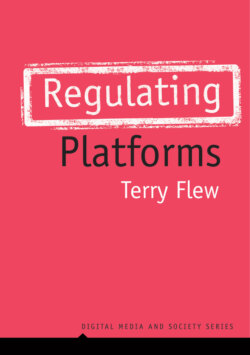Читать книгу Regulating Platforms - Terry Flew - Страница 18
Freedom and Government
ОглавлениеThe connections between neoliberalism, public policy, and neoclassical economics make more sense when they are associated with the rise to prominence of economics as a dominant language of policymaking. Historically, economics has lent itself to practices of government. Michel Foucault observed that the ‘liberal arts of government’ were connected in two key respects to the rise of political economy, which can be situated in eighteenth-century Europe. First, the liberal conception of ‘reason of state’ (raison d’état) increasingly sought to set juridical limits on the power and reach of the government. The demand to do so arose from evidence about the inefficiency and overreach of actual governmental practice as much as from a wider conception of human freedom; and political economists such as Adam Smith were crucial to demonstrating the economic inefficiencies that arose from ‘unlimited’ government (Foucault, 2008, pp. 38–44).
The second major connection between the art of government and the rise of political economy was how the turn towards a ‘frugal government’ (p. 37) necessitated the assumption of ‘naturalism’ (p. 61) in market economy, which was now understood to exist independently of government. The notion that market economy has ‘natural laws’ such as those of supply and demand became the corollary to a more utilitarian and strategic approach to government. Such an approach would be based on the calculation of the costs and benefits of state intervention and on the expectation that such interventions do not unduly disrupt the ‘natural order’ that a market economy represented. According to Foucault, this led to a distinctive understanding of the nature of freedom in liberal societies:
Freedom … is not a universal which is particularised in time and geography. Freedom is not a white surface with more or less black spaces here and there and from time to time. Freedom is never anything other – but this is already a great deal – than an actual relation between governors and governed, a relation in which the measure of the ‘too little’ existing freedom is given by the ‘even more’ freedom demanded …
This governmental practice … is a consumer of freedom … inasmuch as it can only function insofar as a number of freedoms already exist: freedom of the market, freedom to buy and sell, the free exercise of property rights, freedom of discussion, possible freedom of expression, and so on. (Foucault, 2008, p. 63)
Peter Miller and Nikolas Rose demonstrated the importance of economics to twentieth-century notions of governmentality, which, following Foucault, they defined as ‘a particular way of thinking about the kinds of problems that can and should be addressed by various authorities’ (Miller and Rose, 1990, p. 2). Miller and Rose argued that the phenomenon known as the Keynesian revolution in economic theory was grounded in new techniques of measuring and accounting for national economies that enabled new forms of economic policy, namely forms based upon ‘action at a distance’ – for example the use of interest rates, taxation policies, or government spending to increase the number of jobs or to constrain price inflation. From this perspective, the rise of neoliberalism – a phenomenon associated with economists such as Friedrich von Hayek, Milton Freidman, George Stigler, James Buchanan, and others – was marked by an insistence that the fine-tuning of aggregate economic variables was insufficient and ineffective when it came to achieving policy goals (Stedman Jones, 2012). Defending market capitalism on moral as well as on economic grounds, these economists proposed that government policy needed to be focused upon governing human behaviour in order to inspire a more market-oriented conduct in citizens and in businesses. This shift towards an ‘advanced liberal’ governmentality, to use Nikolas Rose’s term, proposed a ‘marketization of economic life’ and a new understanding of freedom: ‘Freedom, here, is redefined’ as ‘the capacity for self-realization which can be obtained only through individual activity’ (Rose, 1999, p. 145).
The emergence and popularization of the Internet during the period 1990–2010 can be seen as both being shaped by, and shaping, such market-oriented conceptions of freedom. These processes revolved around two key issues: the concept of a new economy based on information and knowledge, and the primacy of freedom of speech. The concept of a new economy was premised upon the idea that worldwide economies were shifting away from an industrial era based primarily on the manufacturing of physical goods and towards what was variously called a post-industrial economy, an information economy, or a knowledge-based economy – a situation in which, as Geoffrey Hodgson observed, ‘the economy becomes relatively less “machine-intensive” and more and more “knowledge-intensive”’ (Hodgson, 2000, p. 93). Authors such as Clay Shirky and Charles Leadbeater pointed to the opportunities presented by mass collaboration, social sharing, and open knowledge sharing to advance innovation and productivity (Leadbeater, 2008; Shirky, 2008). In perhaps the most influential conception of the new economy, Yochai Benkler proposed that the networked information economy was one where ‘the removal of the physical constraints on effective information production has made human creativity and the economics of information … core structuring facts in the new networked information economy’ (Benkler, 2006, p. 4).
